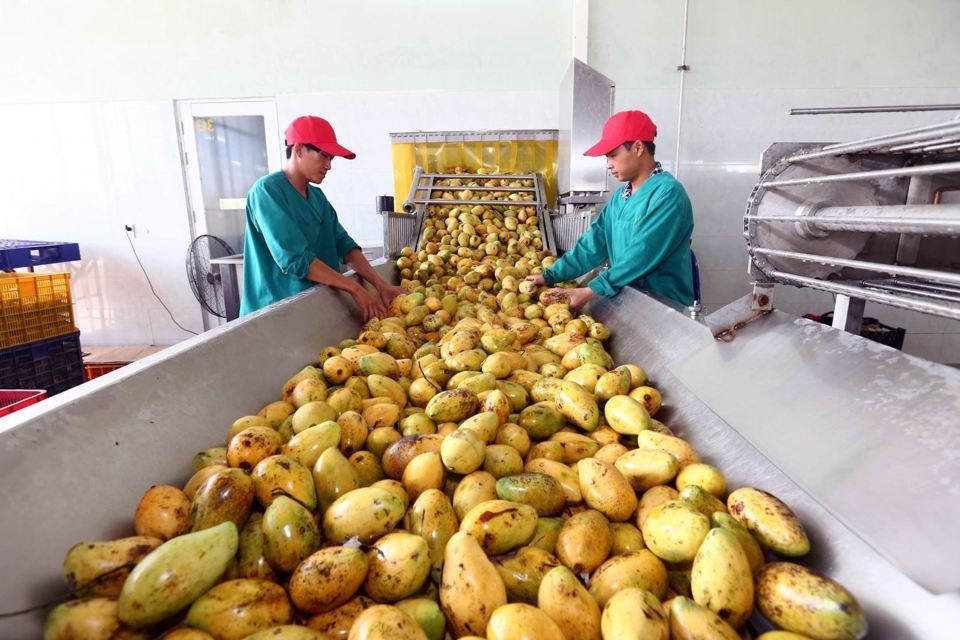Kinhtedothi – Southeast Asian countries have been implementing many policies to promote rice and agricultural product exports to China, one of the world’s leading agricultural product consumption markets.
To maintain and develop exports to a market of more than 1 billion people, the region needs to continue investing in technological innovation, sustainable development and branding for agricultural products.
Signing Free Trade Agreements (FTAs)
FTAs play an important role in reducing tariffs and removing trade barriers, helping to promote export growth and expand markets. For ASEAN countries, this is a core factor in penetrating the Chinese market – one of the largest destinations for agricultural products in the region.
Thailand, with its strength in agricultural exports, has effectively taken advantage of the ASEAN-China Trade in Goods Agreement (ACFTA). This agreement helps reduce tariffs on strategic products such as rice, durian, longan and other tropical fruits.
Thanks to this, Thailand has taken the leading position in agricultural exports to China. Not only fruits, items such as rubber and sugar also benefit from ACFTA, contributing significantly to the increase in agricultural export turnover.
Dr. Thanaporn Charoensuk, an international trade expert, commented: “Thailand has taken advantage of ACFTA to not only promote exports but also add value to the agricultural supply chain. This also contributes to creating a competitive advantage for the country’s agricultural products.”

Indonesia has signed and implemented ACFTA to boost exports of strategic commodities such as palm oil, coffee and spices. The country’s palm oil not only meets the huge consumption demand in China but also becomes an important raw material in the food industry supply chain there. The implementation of FTAs also helps strengthen Indonesia’s position in the global agricultural market.
Malaysia has also taken advantage of trade agreements to boost agricultural exports, especially fresh durian and palm oil. In 2023, Malaysia signed many important trade agreements, helping to expand its palm oil market share in China – one of the world’s largest consumer markets. The signing of FTAs not only reduces tariffs but also improves quarantine conditions, making Malaysian agricultural products more accessible to the Chinese market.
Negotiating and signing the Protocol on Phytosanitary
To access the Chinese market, Southeast Asian agricultural products must meet strict phytosanitary standards. Protocols between countries in the region and the world’s third largest digital economy have created a clear legal framework, helping to open the market to a wide range of products.
Thailand and China have also signed several phytosanitary protocols, allowing products such as durian and longan to be exported officially. The Bangkok government has worked closely with Chinese quarantine agencies to ensure a quick and transparent process.
According to agricultural expert Dr. Chanathip Rattanachot from Kasetsart University, Thailand, signing phytosanitary protocols not only facilitates agricultural products to access the Chinese market but also helps improve product quality.
“China’s food inspection standards are very strict, from seed selection, cultivation to post-harvest processing. This urges Thai manufacturers to adopt modern technology and modern product manufacturing processes for their products,” he said.
Malaysia focuses on durian and palm oil, two strategic products with great potential in China. Negotiating quarantine and quality standards will make it easier for Malaysian products to access this market.
Improve product quality and meet food safety standards.
Food quality and safety are important factors to maintain and expand market share in China. Southeast Asian countries have invested heavily in improving product quality to meet strict market requirements.
Malaysia has invested in the durian supply chain, from cultivation, harvesting to storage and transportation. These improvements help improve the competitiveness of Malaysian durian in the Chinese market, where consumers are increasingly concerned about food quality and safety.
Indonesia focuses on sustainable production, especially palm oil.
Many enterprises have applied international certification standards such as RSPO (Roundtable on Sustainable Palm Oil) to meet the needs of the Chinese and world markets.
According to expert Dr. Aditya Kusuma of Gadjah Mada University: “Compliance with international standards such as RSPO not only helps Indonesian enterprises penetrate deeper into the Chinese market but also builds a positive image of the palm oil industry for global consumers.”
Thailand has implemented the GAP (Good Agricultural Practices) program to improve product quality and increase exports of rice, fruits and other agricultural products. This is an important factor in helping the country’s agricultural products maintain their competitiveness in China.
Developing logistics infrastructure and improving customs procedures
One of the major barriers to agricultural exports is transportation costs and time. To address this problem, Southeast Asian countries have invested heavily in logistics infrastructure and improved customs procedures.
Singapore, with its advanced seaport system and logistics services, plays a role as a transit hub for agricultural products from Southeast Asia to China. Services such as cold storage and supply chain management help maintain product quality during transportation.
Malaysia and Indonesia have also improved their transport and logistics infrastructure, especially major seaports such as Port Klang (Malaysia) and Tanjung Priok (Indonesia). These improvements help reduce shipping costs and shorten delivery times.
Supporting businesses to participate in international fairs and exhibitions
Southeast Asian countries have actively organized and participated in international trade fairs and exhibitions in China to promote their products and seek business partners.
Indonesia regularly organizes trade promotion events in China, introducing key products such as coffee, palm oil and spices. This is an opportunity for businesses to build partnerships and expand markets.
Thailand organizes campaigns to promote tropical fruits such as durian and longan in major cities in China. These events not only attract consumers but also raise awareness of the national brand.
Singapore participates in international trade events, not only to promote products but also to provide related services such as logistics and finance, supporting agricultural exports of the Southeast Asian region.
Source: https://kinhtedothi.vn/cac-nuoc-dong-nam-a-day-manh-xuat-khau-nong-san-sang-trung-quoc.html
